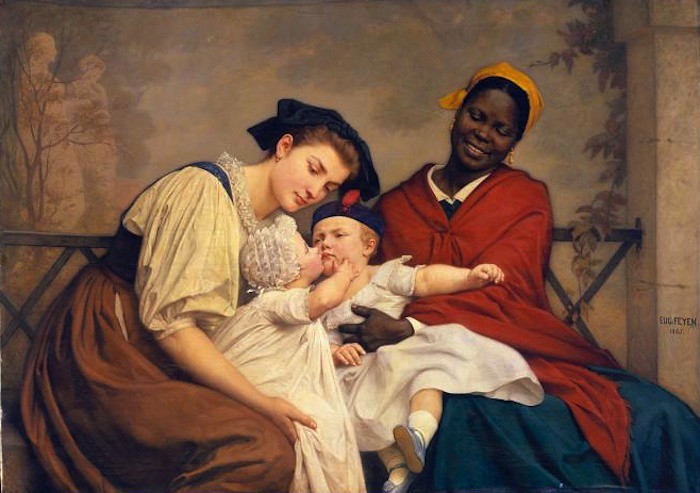The Miriam and Ira D. Wallach Art Gallery at Columbia University
October
24, 2018 – February 10, 2019


Frédéric Bazille, Young Woman with Peonies, 1870. Oil on canvas, 23-5/8 × 29-9/16 in. (60 × 75 cm). National Gallery of Art, Washington, D.C., Collection of Mr. and Mrs. Paul Mellon. Image courtesy National Gallery of Art, Washington, D.C.
Frédéric Bazille, Young Woman with Peonies, 1870
The Miriam and Ira D. Wallach Art Gallery at Columbia University in New York City will present the exhibition Posing Modernity: The Black Model from Manet and Matisse to Today, a sweeping re-examination of the history of modern art.
On view October 24, 2018 – February 10, 2019 at the Wallach, located in Columbia’s Lenfest Center for the Arts on 125th Street west of Broadway, the exhibition presents more than 100 works of art from the mid-19th century to today, on loan from more than 40 public and private collections.
Created by artists from Édouard Manet, Edgar Degas, and Henri Matisse to Romare Bearden, and Mickalene Thomas, the works show how the representation of the black female figure has been central to the development of art for the past 150 years.
Posing Modernity is co-organized by the Wallach and the Musée d’Orsay, Paris. Columbia’s presentation is curated by Denise Murrell, the Wallach’s Ford Foundation Postdoctoral Research Scholar.
Henri Matisse, Dame à la robe blanche (Woman in White), 1946, Oil on canvas; 96.5 x 60.3 cm. Des Moines Art Center, Acc. No. 1959.40. Courtesy The Matisse Foundation. © 2017 Succession H. Matisse / Artists Rights Society
After being shown at the Wallach, Posing Modernity will be expanded to include other works and will be presented as Le Modèle noir de Géricault à Matisse at the Musée d'Orsay, from March 26 to July 14, 2019.

In New York, the presentation focuses specifically on the black female figure, beginning with Edouard Manet’s 1860s portrayals of Laure, the model who posed as the maid in Olympia, and here:

Jacques-Eugène Feyen, Le baiser enfantin (“The Childlike Kiss”), 1865. Oil on canvas, 110 by 152 cm. Palais des Beaux-Arts, Lille, France
In Paris, a broader and expanded treatment of the black figure begins with portaits by Marie-Guillemine Benoist and Jean-Louis André Théodore Géricault at the start of the 19th century.

Édouard Manet, Baudelaire's Mistress (Jeanne Duval), 1862. Oil on canvas; 89.5 x 113 cm. Museum of Fine Arts, Budapest
In both New York and Paris, the exhibition explores the work of Manet’s Impressionist-era cohort, including Frédéric Bazille, Edgar Degas and the photographer Nadar; sculptors including Charles Henri Joseph Cordier and Jean-Baptiste Carpeaux; paintings, drawings and prints of Henri Matisse (before and after his 1930s Harlem visits); the portraiture of diverse artists of the Harlem Renaissance, including Charles Alston and William H. Johnson; and the legacy of these depictions for successive generations of postwar modern and contemporary artists, from Romare Bearden and Faith Ringgold through to the current moment.
By taking a multidisciplinary approach that focuses on the connection between the history of art and the history of ideas, the exhibition will study aesthetic, political, social and racial issues as well as the realm of the imagination—all of which is revealed in the representation of black figures in visual arts from the French and American abolition eras to the present day.
Publication
November 27, 2018
224 pages, 9 x 10 1/4
177 color illus.
ISBN: 9780300229066
Hardcover
The forthcoming exhibition catalog "Posing Modernity The Black Model from Manet and Matisse to Today" is by Denise Murrell (Yale University Press).
An ambitious and revelatory investigation of the black female
figure in modern art, tracing the legacy of Manet through to
contemporary art
This revelatory study investigates how changing modes of representing the black female figure were foundational to the development of modern art. Posing Modernity examines the legacy of Édouard Manet’s Olympia (1863), arguing that this radical painting marked a fitfully evolving shift toward modernist portrayals of the black figure as an active participant in everyday life rather than as an exotic “other.”
This revelatory study investigates how changing modes of representing the black female figure were foundational to the development of modern art. Posing Modernity examines the legacy of Édouard Manet’s Olympia (1863), arguing that this radical painting marked a fitfully evolving shift toward modernist portrayals of the black figure as an active participant in everyday life rather than as an exotic “other.”
Denise Murrell
explores the little-known interfaces between the avant-gardists of
nineteenth-century Paris and the post-abolition community of free black
Parisians. She traces the impact of Manet’s reconsideration of the black
model into the twentieth century and across the Atlantic, where Henri
Matisse visited Harlem jazz clubs and later produced transformative
portraits of black dancers as icons of modern beauty.
These and other
works by the artist are set in dialogue with the urbane “New Negro”
portraiture style with which Harlem Renaissance artists including
Charles Alston and Laura Wheeler Waring defied racial stereotypes. The
book concludes with a look at how Manet’s and Matisse’s depictions
influenced Romare Bearden and continue to reverberate in the work of
such global contemporary artists as Faith Ringgold, Aimé Mpane, Maud
Sulter, and Mickalene Thomas, who draw on art history to explore its
multiple voices.
Featuring over 175 illustrations and profiles of several models, Posing Modernity illuminates long-obscured figures and proposes that a history of modernism cannot be complete until it examines the vital role of the black female muse within it.
Featuring over 175 illustrations and profiles of several models, Posing Modernity illuminates long-obscured figures and proposes that a history of modernism cannot be complete until it examines the vital role of the black female muse within it.
Denise Murrell is curator, Posing Modernity
exhibition, and Ford Foundation Postdoctoral Research Scholar at the
Miriam and Ira D. Wallach Art Gallery at Columbia University.
